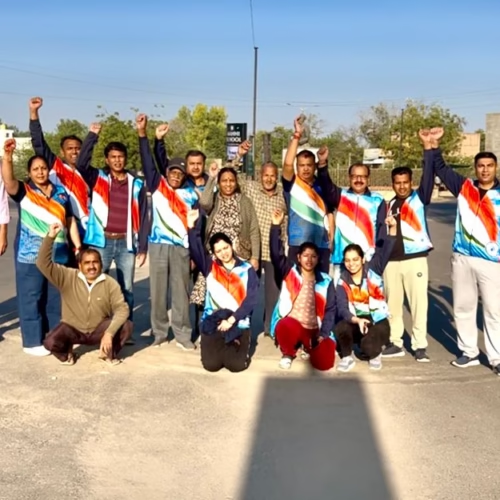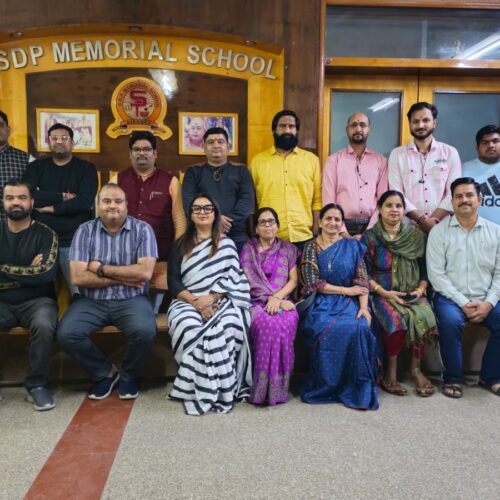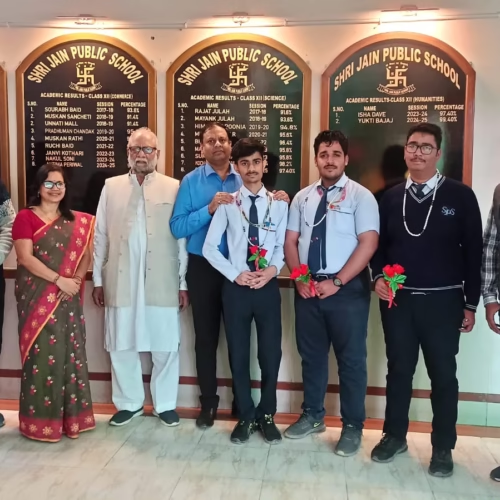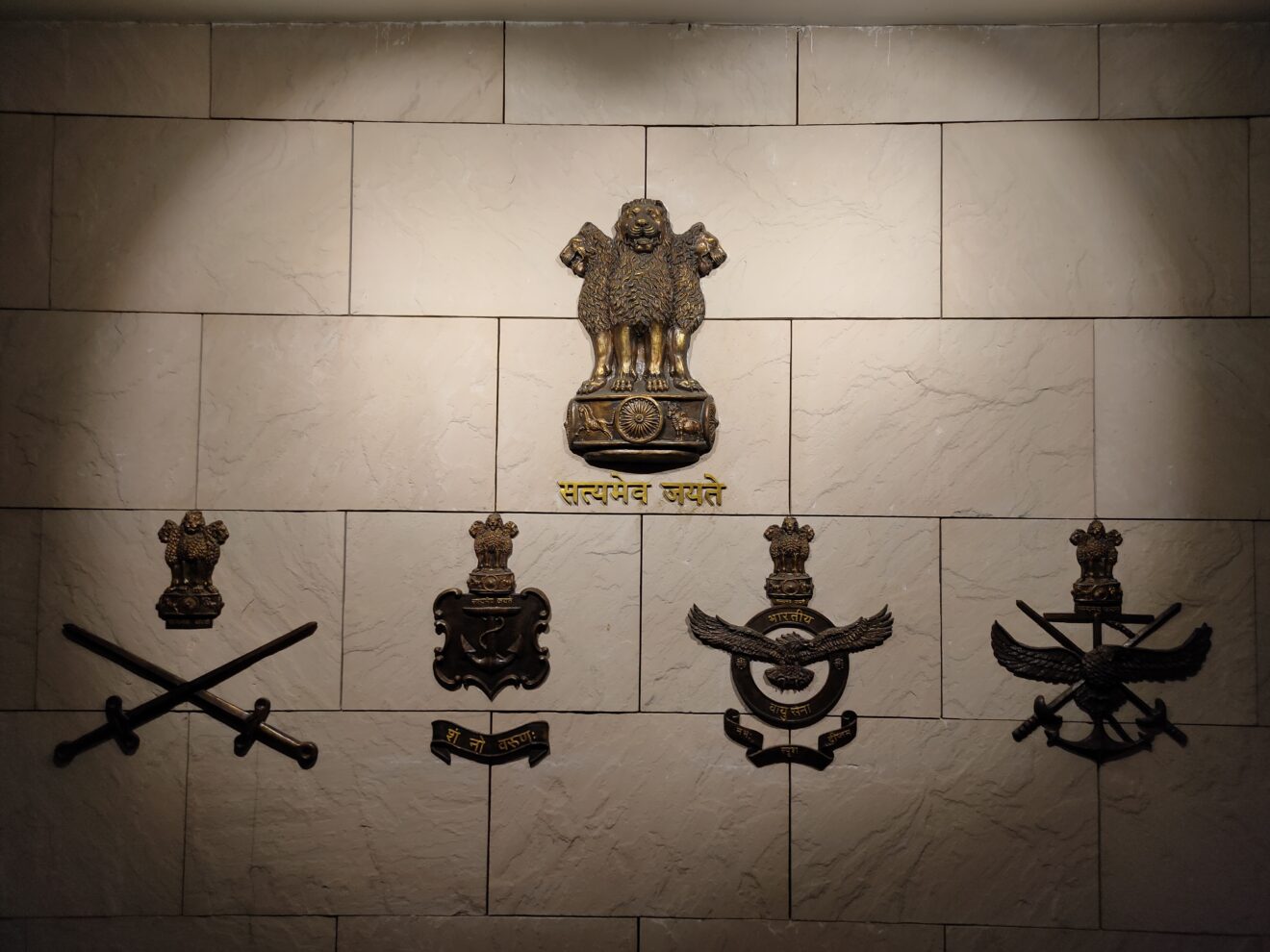BY DEFENCE JOURNALIST SAHIL | T.I.N. NETWORK
CDM Officers Conduct Landmark “COMPASS” Capsule in Sri Lanka — Strengthening Strategic Thinking Among Multinational Defence and Police Forces
Colombo, Sri Lanka | October 20, 2025 —
In a remarkable display of India’s growing role in shaping global strategic education and defence cooperation, a team of three officers from the College of Defence Management (CDM), Secunderabad, successfully conducted a five-day capsule on Comprehensive Assessment for Security Strategies (COMPASS) for senior-level multinational armed forces and police officers at the National Defence College (NDC), Colombo.
This high-level academic and strategic programme reflected India’s expanding footprint in international military education and capacity-building, underscoring the country’s intellectual leadership in defence management, security assessment, and strategic policy formulation.
A Strategic Initiative Rooted in India’s Defence Thought
The COMPASS capsule, conceptually designed and developed by CDM under the aegis of the Headquarters Integrated Defence Staff (IDS), serves as a comprehensive and structured framework for the formulation and evaluation of National Security Strategies (NSS).
The 5-day programme aimed at enhancing the analytical and strategic thinking capabilities of senior defence professionals from various friendly nations, bringing them together under a common framework to deliberate on the core components of modern security strategy — from conception to implementation.
Participants included officers of the Sri Lankan Armed Forces, Police Service, and select foreign contingents, currently undergoing the prestigious NDC Course in Colombo.
Framework and Pedagogy: Integrating Strategic Intent with National Vision
At its core, COMPASS is not merely a curriculum; it is an intellectual model of national strategic assessment, structured around four crucial stages —
- Establishing Strategic Intent: Understanding the guiding philosophy of national leadership and the security vision of the state.
- Strategy Formulation: Identifying objectives, resources, and courses of action in line with national interests.
- Strategy Implementation: Translating policy into practice through defence planning, institutional alignment, and inter-agency coordination.
- Strategy Evaluation: Periodic review mechanisms to assess effectiveness and adapt to evolving geopolitical realities.
During the capsule, participants were introduced to real-world case studies, interactive war-gaming modules, and analytical exercises designed to simulate the challenges of modern security management.
The Indian faculty team facilitated in-depth discussions on the nexus between National Interest, National Power, and National Security, providing a comparative understanding of how these elements shape the strategic posture of modern states.
Bridging Theory and Practice: The Relevance of Geopolitical Theories
The COMPASS framework also placed strong emphasis on the relevance of classical and contemporary geopolitical theories — from Mahan’s concept of sea power and Mackinder’s Heartland theory to modern ideas of cyber, space, and cognitive warfare.
Through this lens, participants explored the evolving nature of national power in an era marked by hybrid conflicts, strategic competition, and global interconnectedness.
The lectures and interactive sessions examined how geopolitical principles can be applied to national policy formulation, especially for small and medium powers in the Indian Ocean Region (IOR) — an area increasingly influenced by great power rivalry, regional cooperation, and maritime security concerns.
India’s CDM: A Global Centre of Excellence in Strategic Management
The College of Defence Management (CDM), located in Secunderabad, Telangana, stands as one of India’s premier tri-services institutions dedicated to higher defence management education. Functioning under the Integrated Defence Staff (IDS) and the Chief of Defence Staff (CDS), CDM plays a crucial role in imparting advanced training in the fields of strategic management, decision analysis, logistics, and leadership to officers of the Indian Armed Forces and friendly foreign nations.
Its international engagements, such as the COMPASS capsule in Sri Lanka, highlight India’s commitment to defence diplomacy through education and strategic exchange, aligning with the broader vision of Neighbourhood First and Security and Growth for All in the Region (SAGAR).
Through such initiatives, India continues to project its intellectual capital and leadership in shaping a rules-based, stable, and secure Indo-Pacific.
Sri Lanka’s National Defence College: A Partner in Strategic Collaboration
The National Defence College (NDC), Colombo, has emerged as a premier regional hub for defence studies and strategic thought. Modeled on global best practices and supported by international partnerships, the NDC brings together senior officers from multiple countries to build a common understanding of regional security challenges, crisis management, and cooperative security strategies.
The collaboration between CDM and NDC Colombo reflects a growing synergy in India–Sri Lanka defence education ties, built upon decades of mutual trust and professional camaraderie between the two militaries.
Holistic Learning: Linking National Security, Policy, and Power
Throughout the 5-day capsule, officers examined the interrelationships between National Power, National Security, and National Interest, analysing how political, economic, social, technological, and military components interact to shape a nation’s strategic behaviour.
Participants also engaged in group discussions to evaluate strategic responses to non-traditional threats such as cyber warfare, terrorism, climate change, and information manipulation — issues that transcend borders and demand cooperative regional frameworks.
The CDM faculty encouraged officers to adopt a systems-thinking approach, emphasising how leadership decisions must integrate national goals, institutional capabilities, and external challenges into a coherent national strategy.
A Symbol of India’s Thought Leadership in Defence Diplomacy
The successful completion of the COMPASS capsule in Colombo underscores India’s emergence as a thought leader in regional security studies, not merely as a military power but as a strategic educator and collaborator.
By sharing knowledge frameworks such as COMPASS, India empowers partner nations to develop their own indigenous strategic doctrines, promoting self-reliant security architectures rather than dependency models.
Such educational diplomacy complements India’s operational cooperation with regional forces — ranging from maritime exercises to humanitarian assistance missions — and reinforces India’s image as a responsible and reliable regional power.
Towards a Shared Future of Strategic Stability
As global and regional power dynamics shift, structured frameworks like COMPASS become vital for ensuring that national security strategies remain adaptive, evidence-based, and forward-looking.
The Colombo engagement, therefore, goes beyond classroom learning — it builds bridges of understanding and mutual respect among defence institutions across South Asia and the wider Indo-Pacific.
Through shared dialogue, collaborative training, and exchange of strategic perspectives, such initiatives strengthen not just national capacities but the collective security architecture of the region.
Conclusion: Education as a Pillar of Security Cooperation
The COMPASS capsule at NDC Colombo stands as a shining example of how India’s defence institutions are exporting not just weapons, but wisdom. It reinforces the idea that strategic education and shared learning are the most powerful tools for peace, preparedness, and partnership in the 21st century.
By guiding future military and police leaders through the art and science of strategy formulation, India’s College of Defence Management has once again demonstrated that true strength lies not only in might but in the mastery of thought.
BY DEFENCE JOURNALIST SAHIL | T.I.N. NETWORK
श्रीलंका में भारत की रणनीतिक सोच की गूंज — कॉलेज ऑफ डिफेंस मैनेजमेंट (CDM) के अधिकारियों ने आयोजित किया “COMPASS” कार्यक्रम, बहुराष्ट्रीय सुरक्षा नेतृत्व में दिया नया दृष्टिकोण
कोलंबो, श्रीलंका | 20 अक्टूबर 2025 —
भारत की रक्षा शिक्षा और रणनीतिक सहयोग के क्षेत्र में बढ़ते वैश्विक प्रभाव को रेखांकित करते हुए, कॉलेज ऑफ डिफेंस मैनेजमेंट (CDM), सिकंदराबाद के तीन वरिष्ठ अधिकारियों की टीम ने श्रीलंका के नेशनल डिफेंस कॉलेज (NDC), कोलंबो में बहुराष्ट्रीय सशस्त्र बलों और पुलिस अधिकारियों के लिए पाँच दिवसीय उच्चस्तरीय प्रशिक्षण कैप्सूल Comprehensive Assessment for Security Strategies (COMPASS) का सफल आयोजन किया।
यह कार्यक्रम न केवल भारत की रक्षा कूटनीति की एक नई दिशा को दर्शाता है, बल्कि यह इस बात का भी प्रमाण है कि भारत अब केवल सैन्य शक्ति से नहीं, बल्कि बौद्धिक नेतृत्व और रणनीतिक सोच से भी क्षेत्रीय स्थिरता में योगदान दे रहा है।
COMPASS — भारत की रक्षा सोच पर आधारित एक रणनीतिक पहल
COMPASS कैप्सूल, जो कि हेडक्वार्टर इंटीग्रेटेड डिफेंस स्टाफ (IDS) के अधीन कॉलेज ऑफ डिफेंस मैनेजमेंट (CDM) द्वारा विकसित किया गया है, एक संरचित रूपरेखा (Structured Framework) प्रदान करता है जिसके माध्यम से National Security Strategies (NSS) की अवधारणा, निर्माण और मूल्यांकन किया जा सके।
इस पाँच दिवसीय कार्यक्रम का उद्देश्य विभिन्न मित्र देशों के वरिष्ठ सैन्य और पुलिस अधिकारियों में रणनीतिक सोच, नीति निर्माण और सुरक्षा मूल्यांकन की क्षमता को विकसित करना था।
कार्यक्रम में श्रीलंका की सशस्त्र सेनाओं, पुलिस सेवा और अन्य मित्र देशों के रक्षा अधिकारियों ने भाग लिया, जो वर्तमान में NDC कोलंबो में अध्ययनरत हैं।
CDM की इस पहल ने भारत की “Security and Growth for All in the Region (SAGAR)” और Neighbourhood First नीति को व्यावहारिक धरातल पर उतारते हुए रक्षा शिक्षा को एक सेतु के रूप में प्रस्तुत किया।
रणनीति का ढांचा: विचार से क्रियान्वयन तक
COMPASS केवल एक प्रशिक्षण कार्यक्रम नहीं, बल्कि एक संपूर्ण रणनीतिक सोच का मॉडल है। यह चार प्रमुख चरणों पर आधारित है —
- Strategic Intent (रणनीतिक उद्देश्य): राष्ट्रीय नेतृत्व की दृष्टि और सुरक्षा दर्शन को समझना।
- Strategy Formulation (रणनीति निर्माण): राष्ट्रीय हितों, संसाधनों और लक्ष्यों के अनुरूप कार्यनीति तय करना।
- Strategy Implementation (रणनीति क्रियान्वयन): रक्षा योजनाओं को व्यवहार में लाना, संस्थागत समन्वय और नीति अनुपालन सुनिश्चित करना।
- Strategy Evaluation (रणनीति मूल्यांकन): समय-समय पर सुरक्षा नीतियों की समीक्षा करना और बदलते भू-राजनीतिक परिदृश्यों के अनुसार उन्हें अद्यतन करना।
कार्यक्रम के दौरान प्रतिभागियों को वास्तविक केस स्टडी, वार-गेमिंग सिमुलेशन और इंटरैक्टिव एनालिटिकल सत्रों के माध्यम से आधुनिक सुरक्षा चुनौतियों की समझ दी गई।
भारतीय अधिकारियों ने “राष्ट्रीय हित, राष्ट्रीय शक्ति और राष्ट्रीय सुरक्षा” के पारस्परिक संबंधों पर गहन चर्चा की और यह बताया कि किसी भी राष्ट्र की सामरिक नीति इन तीन स्तंभों पर आधारित होती है।
भू-राजनीतिक सिद्धांतों से लेकर आधुनिक युद्ध तक — COMPASS की सोच
COMPASS कार्यक्रम की एक विशेषता यह रही कि इसमें पारंपरिक और आधुनिक Geopolitical Theories दोनों पर समान रूप से बल दिया गया।
Mahan की Sea Power Theory, Mackinder की Heartland Theory और आधुनिक युग की Cyber, Space और Cognitive Warfare जैसी अवधारणाओं को व्यवहारिक दृष्टिकोण से जोड़ा गया।
इन विषयों के माध्यम से प्रतिभागियों ने यह समझा कि 21वीं सदी में राष्ट्रीय शक्ति केवल सैन्य क्षमता तक सीमित नहीं है — बल्कि यह आर्थिक, तकनीकी, सामाजिक और मनोवैज्ञानिक प्रभावों का संयुक्त परिणाम है।
भारतीय विशेषज्ञों ने यह भी बताया कि भारतीय महासागर क्षेत्र (IOR) के छोटे और मध्यम शक्तिशाली देशों के लिए यह समझना आवश्यक है कि रणनीतिक प्रतिस्पर्धा के बीच अपनी संप्रभुता और सुरक्षा नीति को कैसे संतुलित रखा जाए।
कॉलेज ऑफ डिफेंस मैनेजमेंट — भारत की सामरिक शिक्षा का वैश्विक केंद्र
तेलंगाना के सिकंदराबाद में स्थित कॉलेज ऑफ डिफेंस मैनेजमेंट (CDM) भारत का एक प्रमुख त्रि-सेवा संस्थान (Tri-Services Institution) है जो Integrated Defence Staff (IDS) और Chief of Defence Staff (CDS) के अधीन कार्य करता है।
CDM का लक्ष्य भारतीय सशस्त्र बलों के अधिकारियों के साथ-साथ मित्र देशों के रक्षा अधिकारियों को Strategic Management, Leadership, Decision Analysis, Defence Logistics और Security Policy Formulation में प्रशिक्षित करना है।
श्रीलंका में आयोजित COMPASS कार्यक्रम ने यह स्पष्ट कर दिया कि भारत न केवल क्षेत्रीय सहयोगी देशों के साथ रक्षा अभ्यास और ऑपरेशन साझा कर रहा है, बल्कि अब रक्षा शिक्षा और रणनीतिक विचार-विनिमय का भी केंद्र बन रहा है।
यह कार्यक्रम India’s Soft Power Diplomacy का एक जीवंत उदाहरण है — जहाँ भारत “Weapons नहीं, Wisdom” का निर्यात कर रहा है।
NDC कोलंबो — क्षेत्रीय सुरक्षा सहयोग का साझेदार केंद्र
National Defence College (NDC), Colombo दक्षिण एशिया में रणनीतिक अध्ययन और रक्षा शिक्षा का उभरता हुआ केंद्र है।
यह संस्थान विभिन्न देशों के वरिष्ठ सैन्य और पुलिस अधिकारियों को एक साझा मंच प्रदान करता है, जहाँ वे क्षेत्रीय सुरक्षा चुनौतियों, संकट प्रबंधन और समन्वित रक्षा नीति पर विचार-विमर्श करते हैं।
भारत और श्रीलंका के बीच यह सहयोग रक्षा शिक्षा और रणनीतिक सोच में विश्वास और साझेदारी का प्रतीक है — जो दोनों देशों के दीर्घकालिक संबंधों और सामरिक सामंजस्य को और गहरा कर रहा है।
समग्र दृष्टिकोण — सुरक्षा, नीति और शक्ति का संतुलन
COMPASS कार्यक्रम के दौरान अधिकारियों ने यह अध्ययन किया कि राष्ट्रीय शक्ति (National Power), राष्ट्रीय सुरक्षा (National Security) और राष्ट्रीय हित (National Interest) के बीच कैसे संतुलन स्थापित किया जा सकता है।
उन्होंने इस बात पर भी चर्चा की कि आधुनिक युग के गैर-पारंपरिक खतरे — जैसे Cyber Warfare, Terrorism, Climate Change, Information Manipulation — सीमाओं के पार जाकर वैश्विक स्थिरता को प्रभावित करते हैं।
इसलिए इनसे निपटने के लिए सहयोगात्मक सुरक्षा संरचना (Collaborative Security Framework) की आवश्यकता है।
CDM के विशेषज्ञों ने अधिकारियों को Systems Thinking Approach अपनाने की सलाह दी — ताकि नेतृत्व के निर्णय राष्ट्रीय लक्ष्यों, संस्थागत क्षमताओं और बाहरी चुनौतियों को एकीकृत रणनीति में बदल सकें।
भारत की रक्षा कूटनीति में विचार नेतृत्व की भूमिका
श्रीलंका में COMPASS कैप्सूल का सफल आयोजन भारत की Defence Diplomacy में उभरते विचार नेतृत्व का परिचायक है।
यह केवल एक शैक्षणिक कार्यक्रम नहीं, बल्कि रणनीतिक साझेदारी और आत्मनिर्भर सुरक्षा ढांचे (Self-reliant Security Architectures) की दिशा में एक मजबूत कदम है।
भारत इस पहल के माध्यम से न केवल अपने अनुभव साझा कर रहा है, बल्कि मित्र देशों को उनकी अपनी राष्ट्रीय सुरक्षा नीतियाँ विकसित करने के लिए सशक्त बना रहा है — जिससे क्षेत्रीय स्थिरता और सहयोग को बल मिले।
निष्कर्ष — शिक्षा ही सुरक्षा सहयोग की आधारशिला
NDC कोलंबो में आयोजित COMPASS कार्यक्रम ने यह सिद्ध कर दिया कि 21वीं सदी की सुरक्षा केवल हथियारों से नहीं, विचारों से सुरक्षित होती है।
भारत की यह पहल दिखाती है कि रणनीतिक शिक्षा और साझा सीख (Shared Learning) ही दीर्घकालिक शांति और साझेदारी की सबसे बड़ी शक्ति है।
CDM के इस कार्यक्रम ने यह संदेश दिया कि सच्ची शक्ति केवल बल में नहीं, बल्कि विचार की गहराई और दूरदृष्टि में होती है।
COMPASS ने दक्षिण एशिया और हिंद-प्रशांत क्षेत्र में “Peace through Knowledge” की अवधारणा को साकार रूप दिया।












Add Comment